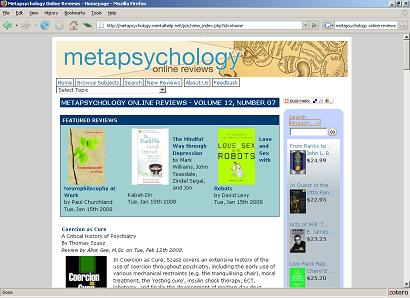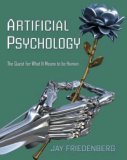February 15, 2008
Comments (0)
- culture
February 12, 2008
New reviews come out on Tuesdays at Metapsychology Online Reviews, and today’s batch includes reviews of The Biology of Freedom: Neural Plasticity, Experience and the Unconscious, an “attempt to synthesize psychoanalysis and neurobiology,” and The Concepts of Consciousness: Integrating an Emerging Science, which, according to the review, failed to realize the hoped-for conceptual integration, although the individual chapters are deemed worthwhile.

Comments (0)
- consciousness
Garcia’s Heart, a first novel by neurologist Liam Durcan, deals with issues of medical ethics, memory, and the difficulty of knowing another person’s mind and heart. The narrator is a neurologist attending the war crimes trial of his former mentor, Hernan García. The accused refuses to speak, thus leaving it up to the narrator to sift through his own memories, trying to reconcile his image of the man who had inspired him to study medicine with the actions attributed to him. In the process, the narrator also examines his own life and the choices that led him to apply neuroscience to market research on behalf of a large corporation.
with issues of medical ethics, memory, and the difficulty of knowing another person’s mind and heart. The narrator is a neurologist attending the war crimes trial of his former mentor, Hernan García. The accused refuses to speak, thus leaving it up to the narrator to sift through his own memories, trying to reconcile his image of the man who had inspired him to study medicine with the actions attributed to him. In the process, the narrator also examines his own life and the choices that led him to apply neuroscience to market research on behalf of a large corporation.
García is a cardiologist and the narrator is a neurologist, so there is some heart vs brain contrast between the two characters; plus the physical heart plays a pivotal role in the plot, making this an appropriate selection for the
“Book A Month Challenge” theme “the heart.”
Comments (0)
- Book A Month Challenge,fiction
February 11, 2008
Artificial Psychology: The Quest for What It Means to Be Human by Jay Friedenberg
by Jay Friedenberg

Is it possible to construct an artificial person? Researchers in the field of artificial intelligence have for decades been developing computer programs that emulate human intelligence. This book goes beyond intelligence and describes how close we are to recreating many of the other capacities that make us human. These abilities include learning, creativity, consciousness, and emotion.
The attempt to understand and engineer these abilities constitutes the new interdisciplinary field of artificial psychology, which is characterized by contributions from philosophy, cognitive psychology, neuroscience, computer science, and robotics.
Comments (0)
- Uncategorized






